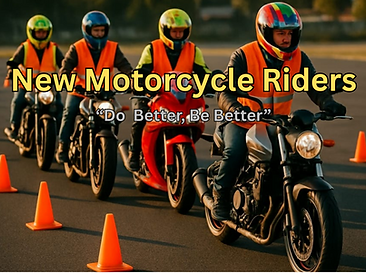Exploring the Intricate Relationship Between Fear and the Art of Motorcycling
- NMR

- May 10, 2025
- 4 min read
Updated: May 12, 2025
Motorcycling represents an exciting mix of freedom, speed, and adventure, drawing enthusiasts from all backgrounds. Yet, alongside that thrill, fear can often ride shotgun for many bikers. By understanding how fear impacts motorcycling, riders can cultivate safer and more enjoyable experiences on two wheels. This blog post dives into the influence of fear on motorcycling, its safety implications, and how riders can use it to elevate their skills.
The Dual Nature of Fear in Motorcycling
Fear is frequently viewed as a negative emotion to be avoided. However, in the context of motorcycling, fear can actually have a dual purpose. It can motivate riders to prioritize safety, sharpening their skills and keeping them alert. For instance, a research study found that 60% of motorcycle accidents result from a lack of warning and awareness, emphasizing the need for vigilance. Conversely, fear can turn harmful if it overwhelms a rider, manifesting as anxiety or leading to hasty choices.
This response is natural and tied to the risks of riding. On busy roads with unexpected elements, a certain level of fear can promote heightened awareness and caution. Such awareness is crucial; it can significantly decrease accident rates and encourage proactive measures, like consistently wearing protective gear or strictly following traffic laws.
The Psychology of Fear While Riding
When individuals first learn to ride, they often grapple with a mix of excitement and fear. That initial trepidation is a normal reaction to balancing on two wheels while navigating unpredictable road conditions. As riders gain experience, they may feel less fearful during routine rides, yet this decrease can breed complacency, leading to potential hazards.
Riders should anticipate this changing relationship with fear throughout their riding journey. As they face different challenges, from sudden rain showers to navigating heavy traffic, their fear may resurface. Acknowledging these feelings is essential. For example, a rider who feels anxious in rain can benefit from targeted training sessions in adverse conditions, helping bolster both their confidence and skills.
Fear’s Influence on Rider Behavior
Fear influences how riders behave on the road, impacting their decisions both in immediate situations and in the long term. A typical response to fear involves avoiding triggering situations. For instance, a new rider might hesitate to ride during rush hour or in bad weather. While this avoidance can be protective, it may also stall personal growth.
Alternatively, some riders choose to confront their fears head-on, seeking to conquer them. This proactive approach can lead to meaningful growth, new experiences, and honed skills. For example, riders pushing their boundaries might enroll in advanced riding courses, which can increase their on-road competence and boost overall confidence.
Understanding Fear Through Training and Experience
Motorcycle training programs stress the importance of skill combined with emotional readiness. Many courses include exercises aimed at helping riders manage their fears constructively. Through practical simulations, riders can learn to better control their bikes and build confidence.
One effective technique is mastering emergency braking. Riders taught this skill often report feeling more secure when facing unexpected obstacles. For instance, studies show that riders who practice emergency maneuvers regularly increase their response rates in critical situations by up to 40%. Additionally, controlled practice of evasive techniques fosters a sense of empowerment and helps riders face their fears instead of yielding to them.
The Role of Community in Managing Fear
The motorcycling community plays a significant role in shaping riders' perceptions of fear. Interacting with fellow motorcycle enthusiasts can provide essential insights and support. Riders who gather to share experiences can reaffirm that fear is a common aspect of riding.
Participating in group rides or motorcycle events can also mitigate fear. Being surrounded by other riders fosters a sense of safety and encourages individuals to tackle their fears together. The shared energy and mutual support during these events often empower riders to step outside their comfort zones, resulting in deeper confidence and skill development.

Transforming Fear into a Tool for Growth
Ultimately, learning to harness fear as a growth tool can transform a rider's journey. Riders can adopt the idea of viewing fear not as an enemy but as a guide. When fear arises, it can serve as an opportunity to reflect on its source and take practical steps to address it.
Self-reflection and acknowledging moments of vulnerability help riders understand their limits and strengths. For instance, a rider anxious about tight corners might set a goal to practice specific cornering techniques. Over time, they gain both skill and confidence by gradually tackling more complex routes and respecting the boundaries that fear reveals.
Reflecting on the Importance of Understanding Fear
Fear, in its connection with motorcycling, is a double-edged sword. While it can lead to anxiety and hesitance, it also serves as a catalyst for improvement, caution, and camaraderie among riders. Comprehending this complex emotion is vital for any rider seeking to enhance their skills and truly enjoy the ride.
Through training, community support, and personal growth, fear can become a powerful motivator that enriches the motorcycling experience. Recognizing fear does not mean giving in to it; rather, it means utilizing it as a stepping stone to becoming a more proficient and confident rider. Embracing this journey with an open heart can lead to unforgettable adventures on the open road.





.png)



Comments